Harriett’s Bookshop: Literature as a Protest
Harriett’s Bookshop: Literature as a Protest
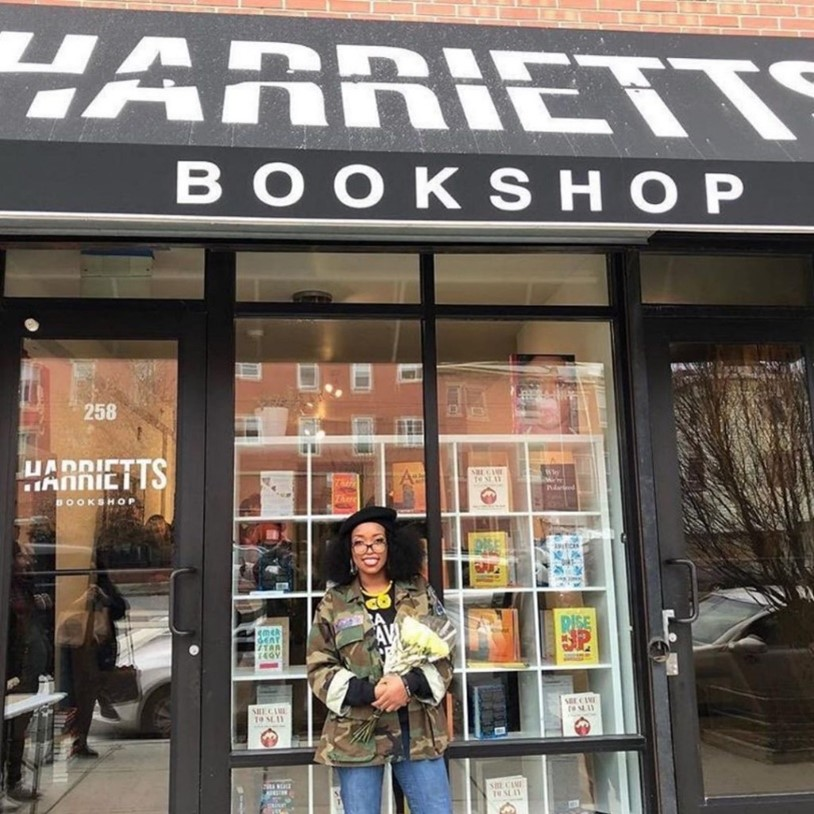
The Fishtown neighborhood of Philadelphia is full of contrast – numerous historic placards, endless rows of ancient brick townhouses, overpriced vegan grocery stores, and quaint little bookshops. One bookshop in particular stands out, nestled at 258 E. Girard Avenue. From the violin music that trickles out the store’s propped doors to the smell of incense and warm oranges wafting on the breeze — it’s hard to miss Harriett’s Bookshop.
Harriett’s Bookshop is not a simple store. Harriett’s is a carefully curated journey through Black women’s literature, culture, and art from the past, present, and future.
Upon walking inside, one can see the shop’s namesake — Harriet Tubman — sitting proudly behind the desk counter as if she owns the place herself. Quotes from famous Black women and men — Maya Angelou, Langston Hughes, Nikole Hannah-Jones — are painted and two-dimensionally framed on the walls, as if to say, “Here, you will take these words as the art that they are.” It is important to keep in mind the social and cultural weight of centering Black voices. The collection of books within Harriett’s “seems to be seeing through them into their distant past as though inspired (Buzbee, 61),” by the compelling history of the marginalization of Black women, drawing these histories out of the objects themselves by their careful placements and orderings. Many authors are local writers of color and local women, for whom of which Harriett’s is dedicated to the preservation of their identities in the literary sphere.
Jeannine Cook, owner and curator of Harriett’s, has been working to preserve Black women’s voices in the literary canon since the beginning — even before the store opened its doors in February 2020.
From Educator to Entrepreneur
As a consultant and teacher, Cook has brought musicians, artists, and writers to classrooms, developing anti-racism curriculums. Her commitment to the Black community, education, activism, and art is mirrored within her passion for Harriett’s — not unlike the passionate Black booksellers of the mid-20th century. Most of these early entrepreneurs, according to Joshua Clark Davis in Liberation Through Literacy, “had extensive backgrounds in leftist and black nationalist politics or were teachers or writers or bibliophiles (38).” Cook is no different.
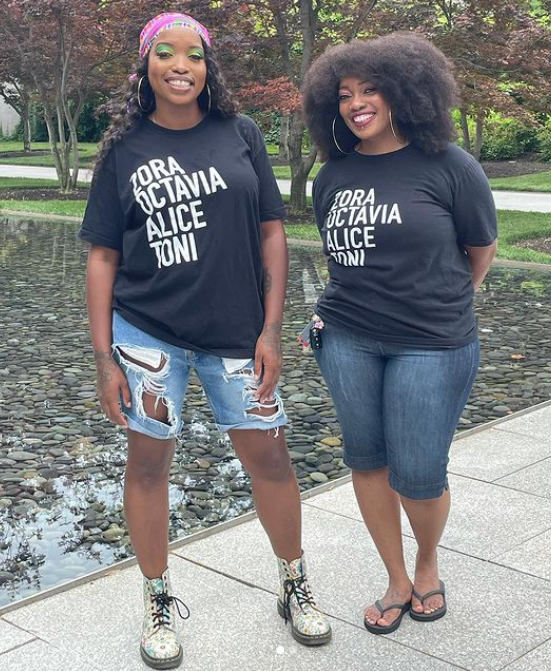
Although Harriett’s was not Cook’s debut in the bookselling sphere, it is certainly her most notable. Upon leasing the store, she aimed for it to create dialogue about community and global issues, as well as housing the celebration of women artists, activists, and writers. She describes the “foundational texts” of the store as being those of Alice Walker, Toni Morrison, Zora Neale Hurston, and Octavia Butler. In fact, Harriett’s first T-shirts were just a simple list of those authors’ first names.
Harriett’s grand opening was akin to an art gallery, with iconic Black-women-authored books displayed in the storefront, featuring Laureate Trapeta B. Mayson, a renowned Philadelphia poet. Afterwards, people considered the store to be a hangout spot, safe space, and sanctuary in a town often seen as violently exclusive.
Black Bookstore, White Town
Six weeks after opening, COVID-19 shut down the U.S. economy. Cook was devastated as the brick-and-mortar store had to close. Still, Harriett’s stayed alive online and on the streets. With the help of “Dr. Gina” South, an ER doctor at Pennsylvania Hospital — and Cook’s dedication to activism — Harriet’s launched the “Essentials for Essentials” initiative in the spring of 2020. Community members could buy books for and send thank-you note “prescriptions” to essential workers. Hundreds of books were hand-delivered to local hospitals, and the initial inventory sold out within a single hour. Cook also set up a grab-and-go shop on the sidewalk, relying on the honor’s system to gain revenue. In an interview with Travel + Leisure, Cook stated, “I broke a lot of furniture. I got rained on. But people need books more than ever at that point (Poitevien, 2022).”
Despite the town’s hipster rise, Fishtown isn’t exactly ideal for a bookshop like Harriett’s. Despite Philadelphia being a cultural melting pot, Fishtown itself has minimal diversity with a 78.1% white population as of 2020. Black or African Americans only make up 5.9% of Fishtown’s 23,000 residents. With Fishtown covering only 1.57 square miles of space (including water area), the town is effectively bursting at the seams (US Zip Codes, 2020).
Additionally, due to low-income and high population density in the area, crime statistics are extremely high, which Harriett’s has been made more than aware of. But the intention of founding the bookstore in such conditions has been a stand towards fighting back.
Following the Black Lives Matter protests in the summer of 2020, paid interns at Harriett’s — referred to as “youth conductors” — assembled signs that said, ”I CAN’T BREATHE.” These were the last words of Eric Garner, a Black man killed by police. Then, after an anonymous donation of books, Cook and fellow staff from Harriett’s took to the streets. They showed up to protests, wielding the power of literature and giving away books — such as The Autobiography of Malcolm X and Emergent Strategy by Adrienne Brown — for free to protestors and those passing by the store. Harriett’s also received a swell of orders for anti-racist works, including How to Be an Anti-Racist by Ibram X. Kendi. On June 6th, 2020, a video of Cook giving away books went viral on their Instagram, and she responded with a post a few days later thanking the 30,000 new followers they had gained.
In the spring of 2020, starting in Minneapolis, Cook travelled to several big BLM protests, donating more than 1,200 inspirational and instructive books to organizers and activists. Cook even did this in front of Philadelphia’s City Hall, where she was nearly shot by a police sniper. The bookstore itself has suffered violence, too: protests following the killing of Walter Wallace Jr., a 27-year-old Black man, in West Philadelphia made Harriett’s a target. Neighboring stores’ windows were shattered. Harriett’s received death threats and rape threats via email. People spewed racist and derogatory words. White men outside the shop, who proclaimed themselves “protectors” of police, wielded baseball bats and tore apart BLM banners.
Knowing full well the risks of opening a black-owned bookshop in an area like Fishtown, Cook claims that she felt they opened the bookshop here for a reason. Just as Toni Morrison says on the value of myths, songs, and stories, “I regard my responsibilities as a Black writer as someone who must bear witness, someone who must record. But I want to make sure that a little piece of the world I knew, a little piece that I knew, doesn’t get forgotten (Hautzinger, 2019).” Cook exemplifies this well, not only in her own literature, but in her social media presence. Cook has several posts showcasing all she’s achieved as an activist, as a bookseller, and as an independent black female business owner.

Through everything, Cook exclaims that books have been a way to protest racism and fight for Black activism. Despite the neighborhood being majority-white, some residents have been “hella supportive.” “When I went over to Minneapolis for the day to pay respects to George Floyd, there was a woman standing out in front of the bookshop just so that nobody would mess with it (Bienasz, 2020),” she said in an interview with Inc.com.
Despite the violence and oppression against minorities, Cook hasn’t been discouraged by Fishtown’s flaws. In places like Harriett’s, the owners “strive for a design mixing leisure with excitement, casual warmth with soft elegance, high-brow culture with worn-shoe comfort, and serious study with simple fun (Miller, 92).”
A Sanctuary of Arts and Culture
In addition to being a haven, the bookshop has become a vibrant cultural hub within the Fishtown neighborhood. The space transcends the traditional confines of a bookstore, transforming itself into a dynamic stage for a diverse array of events, performances, and art exhibitions. Their commitment to fostering community engagement is thus evident through a rich tapestry of cultural activities.
By seamlessly weaving together the realms of literature and performance arts, Harriett’s offers a platform for locals to showcase their talents. The bookstore’s stage has witnessed a myriad of performances, from poetry readings to live music, creating an intimate and immersive experience for attendees. Musicians fill the air with melodies, creating a harmonious backdrop that complements the literary ambiance. The rhythmic cadence of spoken word performances, the soulful tunes of jazz, and the vibrant energy of live bands all contribute to the unique atmosphere that Harriett’s cultivates. Beyond this, the reading garden in the back of the store provides space for patrons and neighbors to enjoy literature, encouraging reading above retail and sales. This integration of literature and performance art not only enhances the cultural richness of the space but also reinforces the interconnectedness of various artistic expressions.
Photos showcasing events at Harriett’s like live music, book signings, candlelight readings, and more! (Harriett’s Bookshop Instagram)
The design of the space itself is critical for the artistic ambiance as well. The openness of the floorplan, and the shop’s constant physical rotations, keep the shop new and fresh for readings, musical events, book signings, book club meetings, dances, and even mimosa nights. The shelving and organization are changed monthly, so one can experience the store anew. Several light, white cubes and tables change in location, number, and size based on which book is currently “on exhibit.” Cook creates these exhibits in tandem with the authors, an excellent example being their recent promotion of The1619 Project, a long-form journalistic book written by Nikole Hannah-Jones. Hannah-Jones visited the shop many times during the promotion of her book, ultimately forming a relationship with Cook; a “sisterhood.”
Harriett’s challenges and scorns the idea that “the ‘beauty’ of much Non-Western ‘art’ is a recent discovery (Clifford, 227),” and calls marginalized works of past and present into the foreground of the definitions of literature and culture. When books like The1619 Project are featured, they consume the store, showing up repeatedly or taking up entire cubicle walls as if to chant the title of the book again and again. This contrasts to the classic “books in piles on the floor” aesthetic that one might expect from an indie bookstore, replacing it with deep reverence, a sort of holy space for books to be appreciated, worshipped, and enacted. Harriett’s creates here “the most profound enchantment for the collector…the locking of individual items within a magic circle in which they are fixed (Buzbee, 60),” as the books are held up as pieces of a mosaic tiled art piece, each book coming together to tell a remarkable story.
Harriett’s even implements Cook’s background as an educator, extending the store’s community towards the youth. The children’s section of Harriett’s is given a large, roomy area with low chairs and a schoolhouse-themed painting on the walls. Unlike the other rotating shelves, this area is consistent, always featuring children’s books about black women and children. Where the main body of the store feels like a gallery, this space feels warm, small, more cluttered, like a children’s play space. Mantras are repeated on the walls and titles of the books: “Black is beautiful,” “the world is yours,” “Black girl magic.” This area is made to welcome children, to provide a place full of literature designed for them. In the picture book that Cook published, “Harriett’s Bookshop”, children are reminded of all these things and more, depicting Harriett’s as a place full of literature designed for them.
Near the reading garden and the children’s section, there is a door leading to the basement of the store — what Cook calls The Underground.
Harriett’s as a Reparative Space
In the Underground, the lights are dim, and patrons are encouraged to use candles to traverse the bookshelves, paying homage to those Black readers of the past who had to hide in order to read. And yet, there is contrast since the basement feels like a neon night club, something Harriett’s takes advantage of with their fun and funky Book “Clubs” hosted in the basement’s moody neon lighting. Music and lightly boozy refreshments enliven the scene. At the bottom of the stairs is a shrine dedicated to Tubman, affirmations in neon light, candles lit and unlit.
Along the walls are highly specified, unlabeled categories of gently used books. Books shelved in the Underground are grouped in overly specified sections such as: Black magical realism, memoirs about being Black and Queer, books about the Underground Railroad, Star Trek, slice-of-life fiction set post-Civil War, the Harlem Renaissance, women in politics, and more. The refusal to level these niches, using the underground railroad in the name of the space, and the shrines dedicated to fallen Black brethren all pay homage to Black culture. The Underground offers itself to patrons with a wink and a nod, an “I know, you know” mentality that Harriett’s seems to embrace through Cook’s intense and stylized curation.
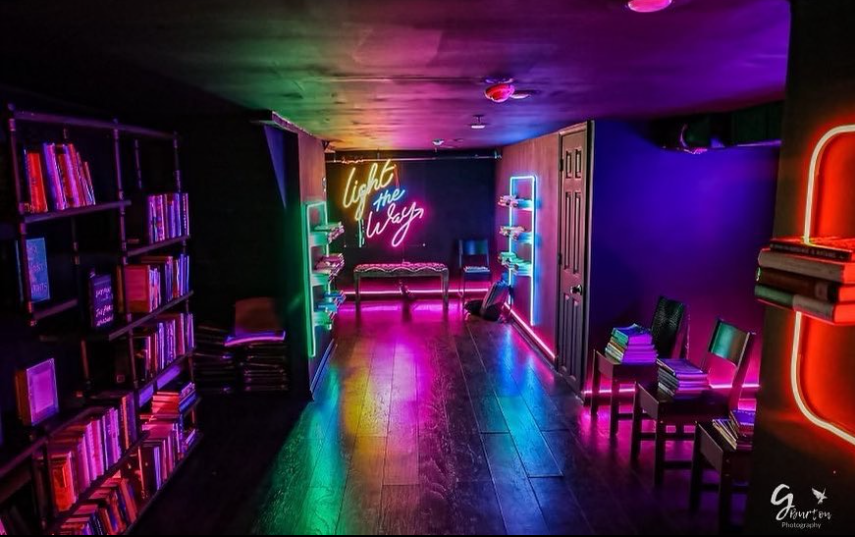
Overall, it is easy to see why Cook’s vision for the bookstore was in part to honor the courageous Harriet Tubman, a historical figure Cook believes doesn’t get enough recognition. In the nineteenth century, Tubman escaped from slavery in the American South to become an abolitionist. Over the course of the next decade, she led about 70 enslaved people to freedom through the Underground Railroad. She has gone down in history as a Black Woman known for her persistence, courage, and discipline.
In July 2021, Cook started a virtual congressional petition to make Harriett Tubman Day (March 10th, the anniversary of Tubman’s death) a federal holiday. Thanks to Cook’s petitioning efforts, it is now an official state holiday in Pennsylvania. In 2022, the Harriett Tubman Day Act went up for consideration by the U.S. Congress, although no vote was scheduled.
In February 2022, Harriett’s monthly theme was “reparations,” echoing the bookshop’s core themes of Black discussion and activism. The staff launched the Sisterhood Sit-In Trolley Tour, a two-hour tour through Philadelphia’s Black-women-owned businesses. And yet, perhaps the most notable decision on Cook’s part was to take a vow of silence every day of that month from sunup to sundown. It was an effort to oppose the commercialization of Black History Month: to take a step back, to listen, and to acknowledge the atrocities that Black people have faced, then and now.
It holds true that the independent bookstore “has the power to produce and preserve idealized visions of local experience—to be a living archive and to act as a hub in social, literary, and cultural networks; to be, in short, a physical landmark of and for local community (Highland, 243).” Harriett’s is a master of this “local experience.” The bookshop and its founder persist in the face of adversity, embodying the resilience inherent in the stories they champion. It all becomes a crucial part of the narrative woven into the cultural fabric of Fishtown—a narrative that emphasizes the importance of challenging norms, fostering inclusivity, and creating spaces that resist erasure.
Harriett’s Bookshop is a space to give honor, artistic worth, and deep reverence to the works of women of color. Whether it be an art gallery, a smoky club, or a cozy schoolroom, the store embodies the environments that Black women are marginalized in and uplifts them, centers them. Cook has made this honoring of Black art and Black lives her life’s work, and her bookshop carries on its back the intense history of a movement towards Black literature’s value and respect.
Harriett’s demonstrates the idea that “inheritance is the soundest way of acquiring a collection (Benjamin 66),” as it attempts to collect the long and star-studded history of the cultures it honors. Cook’s highly developed curation displays that “the most distinguished trait of a collection will always be its transmissibility (Benjamin, 6),” its ability to continue with a momentum that transcends the simple structure of the bookshop it inhabits.
Authors of this Article
Grey Weatherford-Brown
Bedelya McCann
Abigail Pursh
Kelly Hogan
Julia Cerrato
Sources
Texts
Benjamin, Walter. Illuminations : Essays and Reflections. Boston ; New York, Mariner Books, Houghton Mifflin Harcourt, 2019.
Buzbee, Lewis. The Yellow-Lighted Bookshop. ReadHowYouWant.com, 19 Oct. 2010.
Clifford, James. The Predicament of Culture : Twentieth-Century Ethnography, Literature, and Art. Cambridge, Mass., Harvard University Press, 1988.
Davis, Joshua C. “Liberation Through Literacy: African American Bookstores, Black Power, and the Mainstreaming of Black Books.” From Head Shops to Whole Foods: The Rise of Activist Entrepreneurs, Edited by Devin Fergus, Lewis Hyman, Bethany Moreton, and Julia Ott. Columbia University Press, pp. 35-82, https://susqu.instructure.com/courses/4398/files/457836/download?download_frd=1.
Highland, Kristen D. “The Houses of Appleton and Book Cultures in Antebellum New York City.” In the Bookstore, vol. 19, John Hopkins University Press, Baltimore, MD, 2016, pp. 214–255, https://muse.jhu.edu/article/645859. Accessed 2023.
Miller, Laura J. Reluctant Capitalists Bookselling and the Culture of Consumption. Chicago, University of Chicago Press, 2014.
Pyne, Lydia. Bookshelf. Bloomsbury Academic, 2019.
Websites
“Black History Milestones: Timeline.” History.com, A&E Television Networks LLC, 11 May 2023, https://www.history.com/topics/black-history/black-history-milestones.
“Black Lives Matter: a timeline of the movement.” Cosmopolitan, Hearst UK, 21 April 2021, https://www.cosmopolitan.com/uk/reports/a32728194/black-lives-matter-timeline-movement/.
Beck, Tom. “Historians, Community Advocates Fret over the Future of Former Penn Home Building in Fishtown.” Star News, 14 Oct. 2020, starnewsphilly.com/2020/10/13/historians-community-advocates-fret-over-the-future-of-former-penn-home-building-in-fishtown/.
Bienasz, Gabrielle. “She Founded a Black Bookstore in a White Neighborhood. Then … – Inc.Com.” Inc., 9 June 2020, www.inc.com/gabrielle-bienasz-changing-the-world-through-books.html.
Butler, Michael. “Harriett’s Bookshop Owner Jeannine Cook Uses Resilience to Write Her Own Story.” Technical.Ly, Technically Media, 16 Aug. 2023, technical.ly/diversity-equity-inclusion/harriets-bookshop-jeannine-cook/.
Chow, Andrew R., and Annabel Gutterman. “How Coronavirus Is Affecting Independent Bookstores.” Time, Time, 22 Apr. 2020, time.com/5822767/coronavirus-bookstores-amazon/.
Cook, Jeannine. “A Home for Harriett’s Bookshop.” GoFundMe, 2023, https://www.gofundme.com/f/harriettsbookshop.
Cook, Jeannine. “We need a federal holiday to honor Harriett Tubman.” The Philadelphia Inquirer, The Philadelphia Inquirer, LLC, 20 May 2022, https://www.inquirer.com/opinion/hariet-tubman-day-congress-federal-holiday-20220520.html.
Gray, Kylie. “Drexel MFA Student Opens Harriett’s Bookshop in Fishtown.” College of Arts and Sciences, 3 Feb. 2020, drexel.edu/coas/news-events/news/2020/February/drexel-mfa-student-opens-harrietts-bookshop-in-fishtown/.
Harriett’s Bookshop, bookshop.org/shop/harriettsbookshop. Accessed 19 Sept. 2023.
“Harriett’s Bookshop Seeking Permanent Home in Fishtown.” PhillyVoice, 3 May 2021, www.phillyvoice.com/harriets-bookshop-fishtown-philadelphia-gofundme-jeannine-cook/.
“Jeannine Cook of Harriet’s Bookshop on Owning Our Own Spaces.” YouTube, YouTube, 29 Dec. 2021, www.youtube.com/watch?v=arWwie7TLz8&t=142s.
“Prizm® Premier.” Claritas, claritas360.claritas.com/mybestsegments/#zipLookup. Accessed 8 Oct. 2023.
“Harriet Tubman.” Encyclopedia Britannica, 23 Sept. 2023, https://www.britannica.com/biography/Harriet-Tubman.
McCutcheon, Lauren. “Generation Change Philly: The Literary Activist.” The Philadelphia Citizen, 19 May 2022, https://thephiladelphiacitizen.org/jeannine-cook-philly/.
Moody, Eric. “This Philly bookstore owner found a different way to protest.” 6abc, ABC, Inc., 10 June 2020, https://6abc.com/jeannine-a-cooks-bookshop-owner-donate-s-free-books-during-protest/6240981/.
“Parents of Walter Wallace Jr. demand justice and police reform in Philadelphia.” 6abc, ABC, Inc., 7 May 2021, https://6abc.com/walter-wallace-jr-shooting-philadelphia-police-police-involved-west-philly-protest/10594187/.
Poitevien, Jessica. “This Philadelphia Bookstore Honors Harriet Tubman’s Legacy With Literature, Art, and Activism.” Travel + Leisure, Fact checked by Jillian Dara, Travel + Leisure Co., 20 Oct. 2022, https://www.travelandleisure.com/trip-ideas/harrietts-bookshop-philadelphia.
Rebolini, Arianna. “Harriett’s Bookshop Owner Jeannine Cook Says Connection Is at the Root of Everything.” Oprah Daily, Oprah Daily LLC, 28 Feb. 2022, https://www.oprahdaily.com/entertainment/books/a39186848/jeannine-cook-harrietts-bookshop/.
Samuel, Ruth E. “Bookstore named after Harriet Tubman celebrates women authors, artists and activists.” Today, NBC Universal, 12 April 2021, https://www.today.com/money/philadelphia-s-harriett-s-bookshop-celebrates-women-color-authors-t214023.
“Speculation Time: A Forever Home for Harriett’s Bookshop.” OCF Realty, 19 June 2023, www.ocfrealty.com/naked-philly/fishtown/speculation-time-a-forever-home-for-harrietts-bookshop/.
“Spotlight on Harriett’s Bookshop: Penguin Random House.” PenguinRandomhouse.Com, Penguin Random House, www.penguinrandomhouse.com/articles/harrietts-bookstore/. Accessed 1 Nov. 2023.
“We Are the American Heartbreak: Langston Hughes on Race in a Rare Recording.” The Marginalian, 23 Sept. 2016, www.themarginalian.org/2016/09/23/american-heartbreak-langston-hughes-reads/.
Wink, Christopher. “Visit Two-Dozen Indie Bookshops during the Inaugural Philly Bookstore Crawl.” Technical.Ly, Technically Media, 16 Aug. 2023, technical.ly/civic-news/philly-bookstore-crawl/.
US Zip Codes. “ZIP Code 19125 Map, Demographics, More for Philadelphia, PA.” United States Zip Codes, 2020, www.unitedstateszipcodes.org/19125/.
Media
Harriett’s bookshop Instagram. “Sisterhood Sit-In Protest.” Instagram, 13 Oct. 2020, www.instagram.com/p/CGSaPazDegr/?utm_source=ig_web_copy_link&igshid=MzRlODBiNWFlZA.
Harriett’s Bookshop on Instagram. “A Silent Candlelight Tour in the Underground.” Instagram, 30 Dec. 2021, www.instagram.com/p/CYIdi0ODkMy/?utm_source=ig_web_copy_link.
Harriett’s bookshop on Instagram. “Black Lives Matter Protest: Taking a Stand.” Instagram, 27 May 2020, www.instagram.com/p/CAsUJj4jz63/?utm_source=ig_web_copy_link&igshid=MzRlODBiNWFlZA.
Harriett’s bookshop on Instagram. “Harriet Tubman Inspired Musical Rendition and Painting.” Instagram, 18 Oct. 2020, www.instagram.com/p/CGfqe6rDDgA/?utm_source=ig_web_copy_link.
Harriett’s Bookshop on Instagram. “Jeannine Cook and Her Sister Wearing Founding Foremothers T-Shirts.” Instagram, 1 July 2021, www.instagram.com/p/CQyvIBHD3qZ/?utm_source=ig_web_copy_link&igshid=MzRlODBiNWFlZA.
Harriett’s Bookshop on Instagram. “Nikkolas Smith Book Signing for Born on the Water.” Instagram, 18 Nov. 2021, www.instagram.com/p/CWbMPI4pO0B/.
Harriett’s bookshop on Instagram. “Unity Community Center Dancing.” Instagram, 5 Jan. 2022, www.instagram.com/p/CYWQ_7IjV21/?utm_source=ig_web_copy_link&igshid=MzRlODBiNWFlZA.
Harriett’s bookshop on Instagram. “‘We Have to Believe in Things That Seem Impossible.’ behind the Scenes Footage (and Audio) from Our Visit with @nikolehannahjones for The 1619 Project Exhibition.” Instagram, 24 May 2022, www.instagram.com/p/Cd8JCxpDHiy/?utm_source=ig_web_copy_link&igshid=MzRlODBiNWFlZA.
Harriett’s Bookshop [@harrietts_bookshop]. Jeannine Cook in front of Harriett’s Storefront. Instagram, 2 Feb. 2023, https://www.instagram.com/p/B8EfHC7jJmj/.
Hautzinger, Daniel. “From the Archive: Toni Morrison.” WTTW Chicago, 18 Feb. 2019, interactive.wttw.com/playlist/2018/03/13/archive-toni-morrison.
Weatherford-Brown, Grey. Photograph of Harriett’s Interior. 18 Nov. 2023.
Other
McCann, Bedelya. “Harriett’s Bookshop Floor Plan.” ThingLink, Nov. 2023, www.thinglink.com/card/1776303159413572452.
Pursh, Abigail. “Harriett’s and Relevant World Events Timeline.” Time Graphics, 2023, time.graphics/.
Pursh, Abigail. “Harriett’s Bookshop Map.” Google Maps, Google, 24 Oct. 2023, www.google.com/maps.

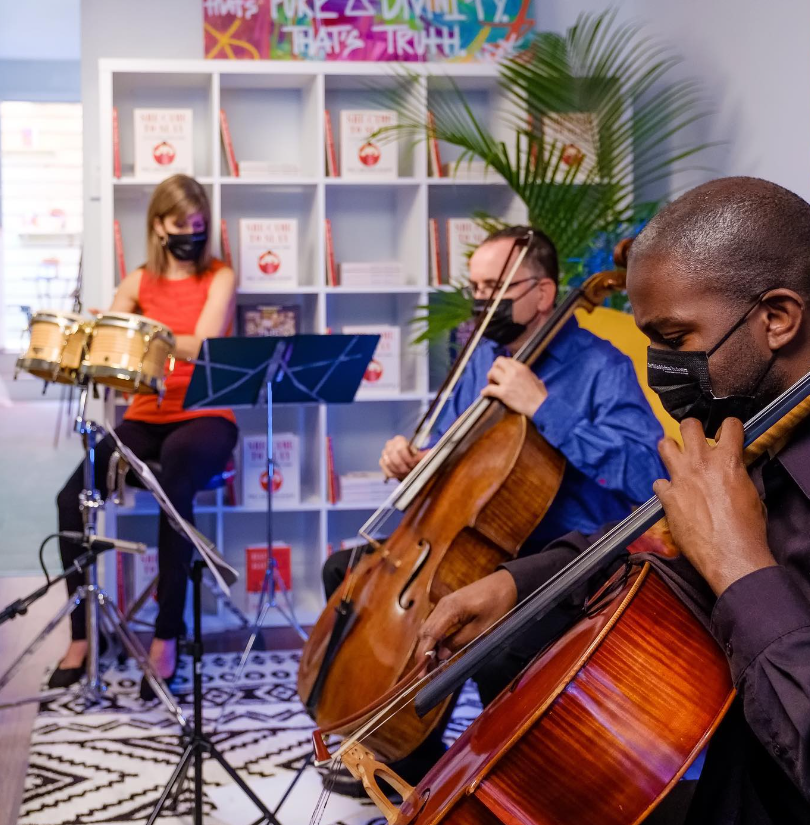
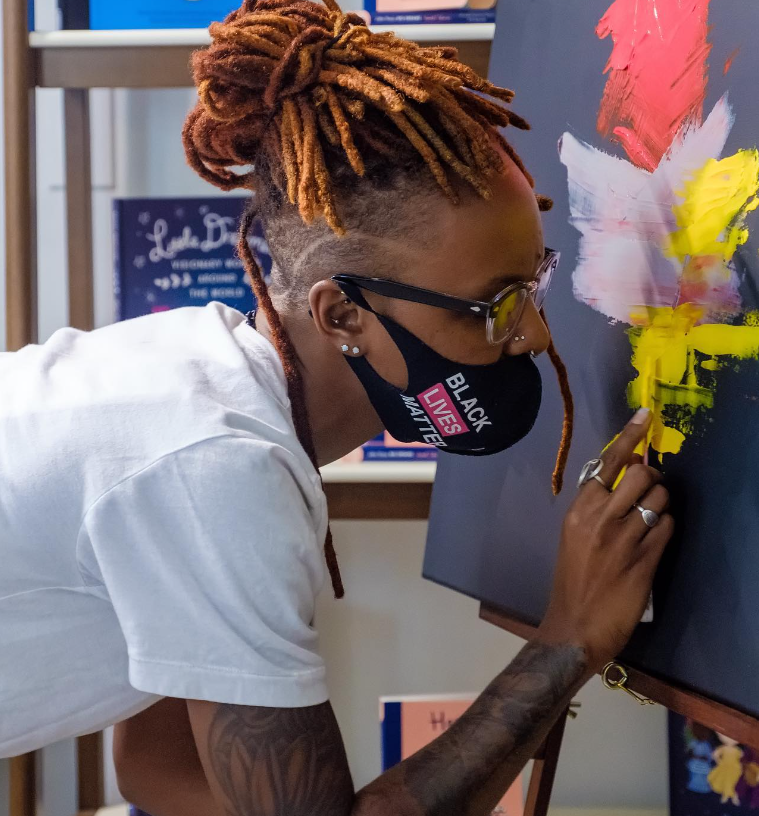
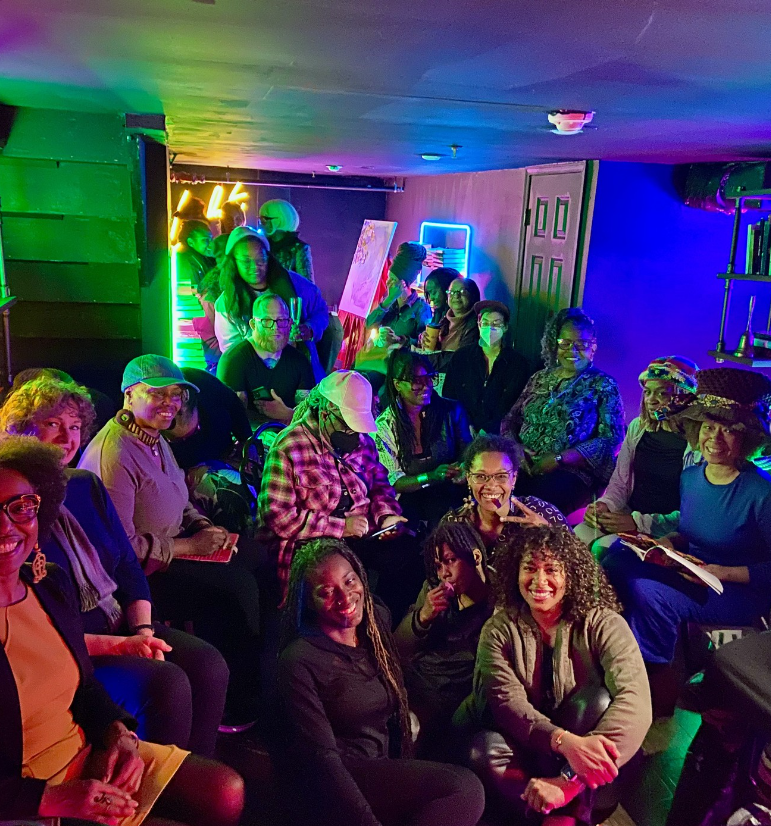
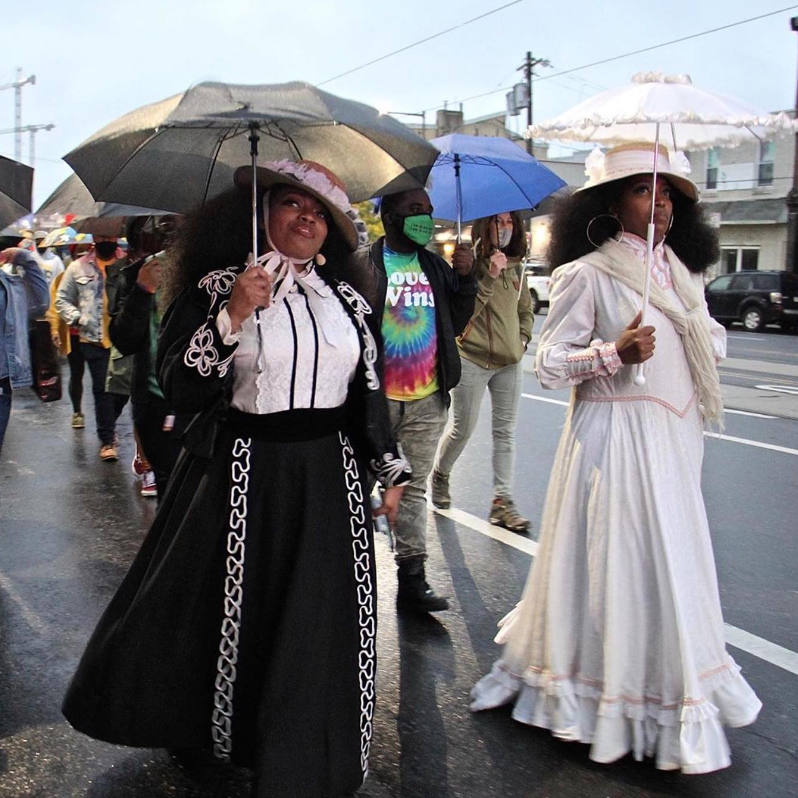
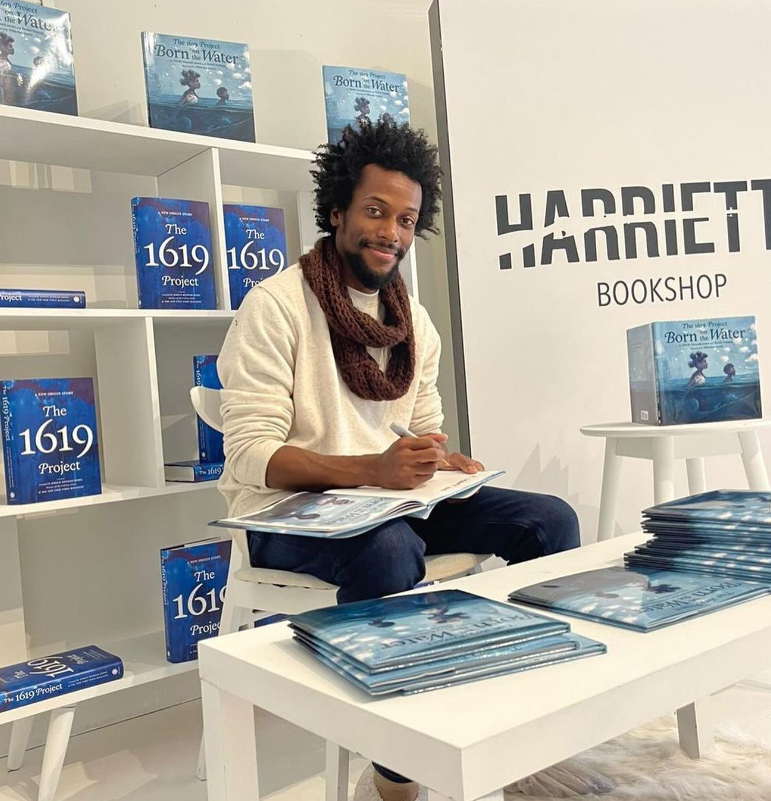
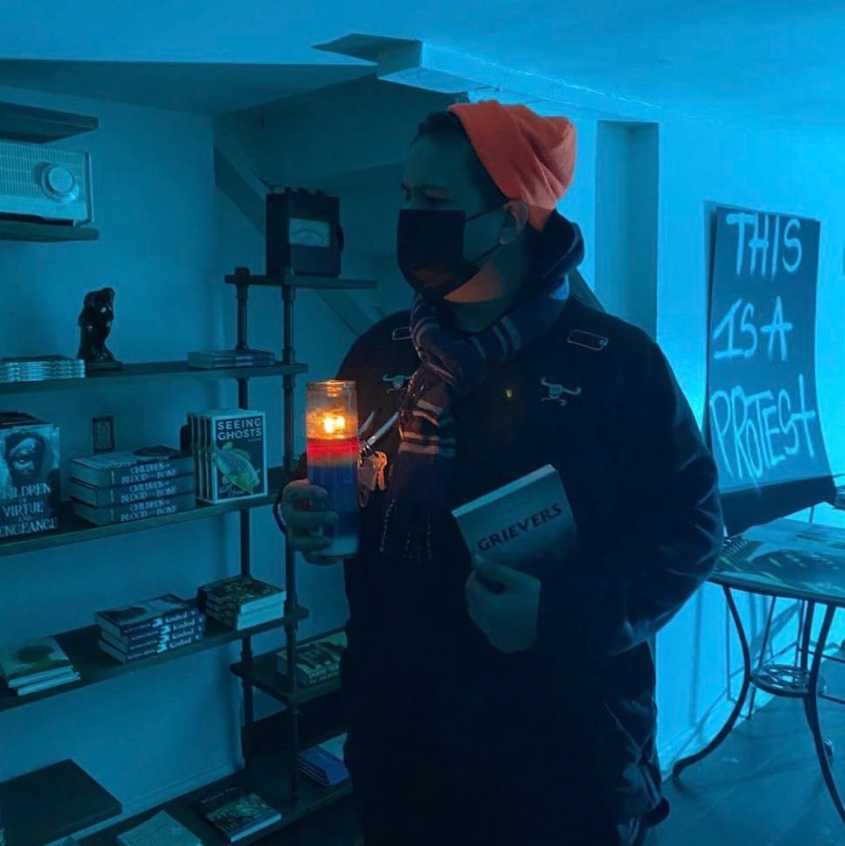
0 Comments